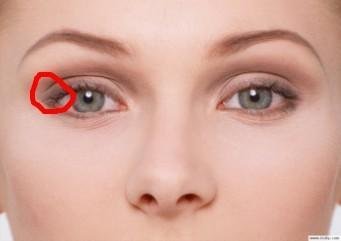
That tiny, fluttering tremor in your eyelid—the one that feels like a miniature moth is trying to beat its way out from under your skin. It starts subtly, a faint pulsing in the lower lid. Sometimes it migrates, setting up a frantic, rhythmless dance in the upper lid. You try to ignore it, but it’s a persistent, private metronome ticking away to a tune of its own.
The common refrain from well-meaning friends is always the same: “You must be so stressed!” And while stress is certainly a frequent accomplice, to write it off as merely that is to miss the deeper, more fascinating message your body is sending. These twitching eyelids (known medically as myokymia) aren’t just symptoms of stress. They are your body’s Morse code, a series of frantic, fatigued nerve signals spelling out a simple, urgent plea: “We are running on fumes.”
Think of the nerves that control your eyelids as tiny, dedicated electrical wires. They are some of the most active and sensitive nerves in your entire body, responsible for the blink reflex that protects your eyes thousands of times a day. Under perfect conditions, these wires hum along smoothly. But introduce a few common saboteurs, and they begin to short-circuit, sending out these erratic, misfiring signals—the twitches.
Decoding the Short-Circuit: More Than Just Nerves
So, if it’s not just stress, what is causing this neurological mutiny? Your body is pointing to several potential culprits, all related to depletion.
- The Electrolyte Imbalance: This is perhaps the most overlooked cause. Your nerves don’t fire on willpower alone; they require a precise cocktail of minerals to conduct electricity properly. Magnesium and potassium are the star players. Magnesium acts as a natural relaxant for your nerves and muscles. When you’re low—often due to sweat, certain medications, or a diet lacking in leafy greens, nuts, and bananas—the nerves can become hyper-excitable. They essentially become “twitchy.” That flutter in your eyelid is a tiny, localized cramp, a direct result of a mineral deficit.
- The Silent Strain of the Screen: Let’s be honest, how many hours a day do you spend staring at a digital rectangle? For many of us, it’s most of our waking hours. This constant, intense focus leads to a triple threat:
- Reduced Blinking: We blink far less often when staring at screens, leading to dry, irritated eyes.
- Ocular Muscle Fatigue: The tiny muscles that control your focus and eyelid movement are held in a state of constant tension.
- Blue Light Exposure: The pervasive glow of our devices can disrupt sleep patterns and contribute to overall systemic fatigue.
Your twitching eyelid is the direct protest of these overworked, under-lubricated ocular muscles. They’ve been holding a strenuous pose for hours and are now seizing up in rebellion.
- The Caffeine and Alcohol Seesaw: That second (or third) cup of coffee in the morning might feel necessary, but caffeine is a stimulant. It revs up your entire nervous system, including those already-sensitive eyelid nerves, making them more prone to misfiring. Conversely, alcohol is a depressant that dehydrates you and depletes essential nutrients, creating a rebound effect of neurological irritability. The twitch is often the hangover of your habits, a literal nervous tremor.
- The Truly Exhausted Spirit: Yes, stress is a factor, but it’s often the chronic, low-grade, “background radiation” type of stress that’s the real culprit. It’s the mental load of remembering your grandchildren’s schedules, worrying about retirement funds, or navigating family dynamics. This kind of perpetual, low-level alarm keeps your entire nervous system in a state of heightened alert, slowly draining its reserves until the most delicate circuits, like those in your eyelids, begin to flicker and fail first.
What Your Eyelid is Trying to Tell You
This tiny tremor is not an alarm bell for a major disease; it’s a friendly, if annoying, tap on the shoulder from your body. It’s saying:
- “Hey, maybe we should turn in before the 11 o’clock news is over tonight.”
- “How about a glass of water instead of another cup of coffee?”
- “A handful of almonds or a spinach salad wouldn’t be the worst idea.”
- “For the love of all that is good, look away from the screen and at a distant tree for twenty seconds.”
How to Quiet the Flutter
Instead of just waiting it out, you can actively respond to this Morse code message.
- The Magnesium Boost: Incorporate more magnesium-rich foods like dark leafy greens, almonds, avocados, and dark chocolate (a happy solution!). A warm Epsom salt bath is also a fantastic way to absorb magnesium and relax the entire body.
- The 20-20-20 Rule: Make it a non-negotiable habit. Every 20 minutes, look at something 20 feet away for at least 20 seconds. This gives the intricate muscles in and around your eyes a crucial break.
- The Warm Compress: Place a warm, damp washcloth over your closed eyes for five minutes. This increases blood flow, soothes the muscles, and can help calm the misfiring nerves.
- The Caffeine Audit: Try switching one of your daily coffees to decaf or a calming herbal tea like chamomile. You might be surprised at how quickly the twitching subsides.
So, the next time that familiar flutter begins, don’t just dismiss it as stress. See it for what it is: a vital, if quirky, communiqué from your overloaded system. Your body is using the most sensitive instrumentation at its disposal to tell you it’s running low. That twitching eyelid isn’t a problem; it’s a plea. And by listening to it, you’re not just stopping a spasm—you’re answering a call for care.